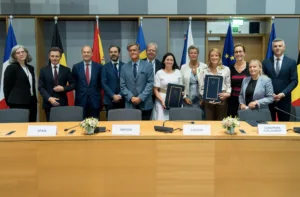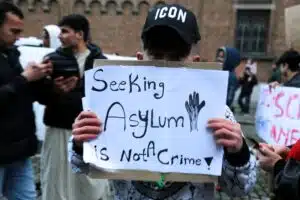Brussels – The second round has begun. Although a positive outcome is not a foregone conclusion, the approval of the Migration and Asylum Pact could be in the decisive hours. In any case, it will be a marathon, beginning this morning with technical discussions and subsequent political negotiations on each dossier and set to last all night, perhaps even into the morning of tomorrow (Dec. 19). A ‘jumbo trilogue’ – that’s the jargon to define the inter-institutional negotiations on all the remaining dossiers on the table of the same legislative package is defined – that will go on until the bitter end, to try to lay the grounds for the most significant pieces of future EU legislation according to the ambitions of all the EU institutions.

Dec. 18-19 was the second chance of trilogues for co-legislators of the EU Parliament and the Council to reach a final go-ahead on all the pending files of the Migration and Asylum Pact, as EU Parliament President Roberta Metsola and the future rotating president of the EU Council, Belgian Premier Alexander De Croo said. After the lack of agreement on December 7, today is the final call to come to an understanding on what is left of the Migration and Asylum Pact (six files, five of which are unavoidable), to pave the way for political agreement on each of the dossiers just before Christmas. In case of a positive outcome to the ‘jumbo trilogue’ the Belgian presidency will have to finalize it, with the 27 EU governments, the relevant parliamentary committees, and the plenary session in February or March will have to approve all pending files individually. Only then can the Migration and Asylum Pact become a reality by the June 6-9, 2024 elections.
“Finally now the agreement is within reach,” Spain’s Interior Minister and rotating president of the EU Council (until the end of the year), Fernando Grande-Marlaska Gómez, assured at the end of the Business Council on December 5. However, Home Affairs Commissioner Ylva Johansson curbed the enthusiasm by saying: “We are not there yet, some work is missing.” Only a few days earlier, President Metsola had been categorical about the expectations of the December trilogues-“I don’t see a chance to present ourselves to citizens without an agreement“-and Belgian Prime Minister De Croo had also made it clear that “finalizing the Migration and Asylum Pact by the European elections is crucial for everyone.” As sources close to the dossiers say, the ‘jumbo trilogue’ on all the files under discussion of the Migration and Asylum Pact is expected to begin in the late evening today (between 11 p.m. and midnight) and a political agreement could come in the course of tomorrow. However, it cannot be ruled out that even this time the discussions at the trilogues will yield “a negative outcome,” the sources say, adding that much will depend on the concessions of the EU Parliament’s rapporteurs to the Council’s demands.
The Migration and Asylum Pact Files
The European Commission submitted the Migration and Asylum Pact on September 23, 2020. However, due to difficulties in the negotiation process, in September last year, the co-legislators agreed on a roadmap to adopt nine files by the end of the legislature (in the spring of 2024). In the process of inter-institutional negotiations, there are five files: the one on the Crisis and Force Majeure Regulation (from October 12), the Asylum and Migration Management Regulation (from June 13), the Amended Asylum Procedures Regulation (started on April 18 at the general principles level and resumed on June 13), the Screening Regulation (from April 25), and the Amended Eurodac Regulation (from December 15, 2022). On December 15 last year, there was a political agreement on three files (inherited from the negotiations on the Commission’s 2016 proposals): the Directive on Reception Conditions for Applicants for International Protection, the Regulation on the New Resettlement Framework, and the Qualification Regulation. Of the nine Migration and Asylum Pact files according to the September 2022 roadmap, the European Parliament did not agree on the Return Directive (the 27 ministers are starting instead from the partial negotiating position reached in June 2019).
Excluding the nine dossiers set out in the roadmap for adopting the Migration and Asylum Pact by the end of the legislature (in spring 2024), there are five other dossiers, of which only two were adopted: the Blue Card Directive in May 2021, and the transformation of the European Asylum Support Office (Easo) into the European Asylum Agency (EUAA), from January last year. Since June 13, the amended Directive on the Single Application Procedure for a Single Residence and Work Permit has been under inter-institutional negotiations. The EU Council adopted the negotiating mandate on the amended Long-Term Residence Directive on November 23. EU Ministers on October 3 merged the Regulation on Instrumentalisation in the Field of Migration and Asylum with the one on Crisis and Force Majeure, while the Parliament sees broad resistance to the concept of ‘instrumentalisation’ and codification in EU law.
At what point are negotiations
Assuming the Return Directive will be shelved, the spotlight should turn to the five pieces of the Migration and Asylum Pact — of the September 2022 roadmap — that are currently in the trilogue. EU sources tell Eunews that eight trilogues have been held on the amended Eurodac Regulation (rapporteur Jorge Buxadé Villalba, Ecr), and one of the main issues that needs solving concerns security markers: the Council would like to apply them to all categories (e.g., for irregular border crossings); Parliament considers them only for asylum seekers and might consider extending them only with “solid guarantees.” The Council then proposed revising the Entry-Exit System (EES) Review Regulation through Eurodac, but Parliament is against it because the former has a Schengen legal basis and is “not relevant” to Eurodac. Finally, the Council proposes that national law enforcement authorities be able to access Eurodac before accessing other national databases. Parliament on the other hand “rejects the idea of Eurodac as a law enforcement tool” and supports the “cascading principle” (first the national database and then Eurodac).

The signing of the roadmap between the EU Parliament and Council negotiators to adopt the Migration and Asylum Pact by 2024 (Sept. 7, 2022)
On the Regulation on Screening (rapporteur Birgit Sippel, S&D), there have been seven trilogues, and the issues that still need to be resolved range from the “fiction of non-entry” with Parliament supporting optional use (mandatory only if the member state uses the border procedure), and the procedural safeguards for screened persons (access to a copy of the screening form, grounds, and conditions for detention, and access to legal assistance for persons not seeking international protection). Parliament believes that the fundamental rights monitoring mechanism should include both screening and border surveillance “to reduce the risk of violations” and opposes the Commission’s proposal to allow screening within the territories of member states. The Council is in favor of granting national authorities direct access to EU systems, while Parliament is for limited access.
More complex, however, is the status of the other three files. The Regulation on Asylum Procedures (rapporteur Fabienne Keller, Renew Europe) has already seen seven trilogues, but there are several concepts that still need to be negotiated. Parliament proposes to define more strictly the conditions for an accelerated procedure (the recognition rate of 20 percent or less should relate to final decisions rather than first instance decisions); the Council proposes to broaden it by introducing other grounds on which member states would be obliged to apply it. Parliament supports the optional use of the border procedure linked to the fiction of non-entry, while for the Council it should remain mandatory “in certain cases.” On the admissibility of applications, Parliament maintained optional decisions for member states; the Council made them mandatory, for example, in cases where the applicant has already been granted international protection in another member State, or in the case of a subsequent application “without new relevant elements.” On the safe third country concept, Parliament proposed additional safeguards while the Council only needs the existence of an agreement between the EU and the third country, “or if the applicants themselves agree to be returned to that country” (MEPs rejected the proposal to have an EU list of safe third countries, instead the 27 governments provide for them at EU and national level). Parliament also proposed introducing a monitoring mechanism to ensure respect for fundamental rights, building on that provided for in the Screening Regulation.
 On the Regulation on Asylum and Migration Management (rapporteur Tomas Tobé, EPP) there have been seven trilogues. The main issues to be resolved concern governance, with “some progress computed on the general common approach, while the Council is reluctant on Parliament’s proposal to establish a coordinator. Solidarity is one of the most sensitive parts of the negotiations: the Council considers financial contributions on par with relocation, while Parliament refers to it as a “primary solidarity measure” and, in case of insufficient needs in the solidarity pool, only Parliament thinks the Commission can distribute the remaining needs among the member states. On the responsible Member State, there are different views on the scope of the criteria for the definition: Parliament’s position is to include family members legally residing in a Member State as a criterion; the Council could accept the first country of entry as the last criterion. There are differences also in the cessation of responsibility for the first country of entry (Parliament sets it at 12 months, the Council at 24). Finally, the definition of family member-particularly the inclusion of siblings-has been eliminated in the Council mandate, and for the family procedure only unmarried siblings of a minor are included.
On the Regulation on Asylum and Migration Management (rapporteur Tomas Tobé, EPP) there have been seven trilogues. The main issues to be resolved concern governance, with “some progress computed on the general common approach, while the Council is reluctant on Parliament’s proposal to establish a coordinator. Solidarity is one of the most sensitive parts of the negotiations: the Council considers financial contributions on par with relocation, while Parliament refers to it as a “primary solidarity measure” and, in case of insufficient needs in the solidarity pool, only Parliament thinks the Commission can distribute the remaining needs among the member states. On the responsible Member State, there are different views on the scope of the criteria for the definition: Parliament’s position is to include family members legally residing in a Member State as a criterion; the Council could accept the first country of entry as the last criterion. There are differences also in the cessation of responsibility for the first country of entry (Parliament sets it at 12 months, the Council at 24). Finally, the definition of family member-particularly the inclusion of siblings-has been eliminated in the Council mandate, and for the family procedure only unmarried siblings of a minor are included.
Finally, there is the most sensitive of all files, the Crisis Regulation (rapporteur Juan Fernando López Aguilar, S&D), with four trilogues already held since October 4. The main problem is the scope of application, because the Council mandate includes instrumentalization as an example of a crisis situation and force majeure, “even though in the Council mandate there is no merger of the legal basis of the proposals.” In contrast, Parliament’s mandate contains no reference to instrumentalization. In the decision-making process, the Council calls for a Council implementing decision (instead of Parliament’s delegated act) to determine crisis situations. Parliament has included a procedure to grant international protection prima facie in crisis situations, the Council is “reluctant, but willing to explore a compromise.” On the solidarity mechanism, for the Parliament, relocation is “the only solidarity measure envisaged for crisis situations,” as opposed to the Council, which envisages other solidarity measures. On derogations to the EU acquis, the Council’s mandate is to extend the duration of the asylum and border procedure to an additional 8 weeks in crisis situations, Parliament’s 4 weeks. Finally, the Council wants an extension of the scope of the border procedure in crisis situations (making decisions on the merits of an application in cases where the percentage of decisions granting asylum is 75 percent or less), Parliament’s mandate eliminated this exception.
English version by the Translation Service of Withub





